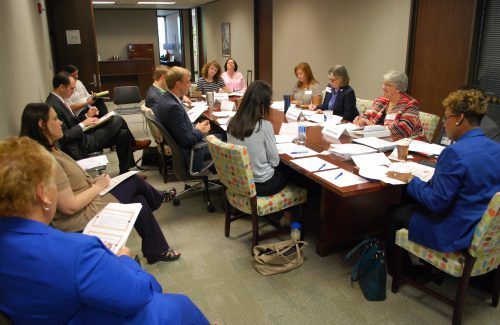Governor Bentley’s ESSA Committee Seeks Input from Experts

MONTGOMERY (Governor’s Office) – The Every Student Succeeds Act (ESSA) Implementation Committee, established in March of 2016 by Governor Robert Bentley, brought in subject matter experts to last week’s third round of work group meetings. ESSA replaces the No Child Left Behind Act and grants educational authority back to the states. Now a state is able to make decisions tailored to the specific needs of its students. To help make those decisions, the committee was briefed on how states can take advantage of the new provisions.
“Input from outside experts provides current research and background experiences that can contribute to the work groups as they carefully consider decisions that guide the development of the overall plan,” said Jeana Ross, Secretary of the Department of Early Childhood Education and chair of the ESSA Implementation Committee.
The Alabama ESSA Implementation Committee is divided into seven subcommittees to better address the specifics of the new law: Accountability; Data Collection and Reporting; Early Learning; Educator Effectiveness; Schools and District Improvement; Standards, Assessments and English Language Learners; Title Programs. David Griffith with The Thomas B. Fordham Institute spoke to the Accountability work group, emphasizing the new flexibility afforded to states.
“I tried to provide some context for the process that Alabama is going through as it begins to implement ESSA, based on what’s happening at the national level, as well as in other states,” Griffith said. “The new law gives states an important opportunity to redesign their accountability systems for the better, so it’s important that they seize that opportunity to create strong, transparent and fair systems for evaluating school performance.”
This redesign allows a state to choose a personalized metric for evaluating its schools’ performance. During his presentation, Griffith highlighted possible metrics for the one specific indicator that states get to decide to report to the U.S. Department of Education.
Other subject matters experts that presented to the subcommittees included representatives from the Education Commission of the States, the Data Quality Campaign, the Center on Enhancing Early Learning Outcomes (CEELO) and the National Conference of State Legislatures.
Jim Squires with CEELO spoke with the Early Learning subcommittee, acknowledging the value of connecting early learning with K-12 and sustaining the growth made from birth to 4 years old. The Schools and District Improvement subcommittee meeting included discussions lead by the Education Commission of the States related to the role of local provisions and state-level assistance to help schools that need comprehensive support.
For one member, the additional insight assisted in providing alternatives and reinforcement for previous decisions.
“I felt like [Griffith] was helpful to me,” said Margaret Clarke, committee member, homeschool mom and former general counsel for the Alabama Policy Institute. “He gave me assurance that we are going in the right direction. I thought he did an excellent job of encouraging discussion and presenting alternatives that could be possible in Alabama.”
For more information regarding upcoming ESSA Implementation Committee meetings, visit governor.alabama.gov/essa.
Provided by the Office of the Governor of Alabama | governor.alabama.gov

